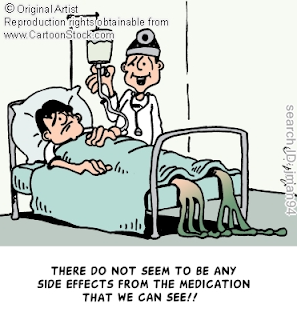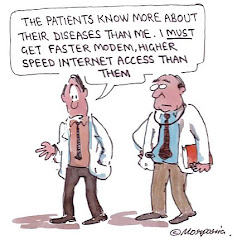Monday, April 12, 2010
Drug Side Effect Not Given to Patient
Liz a 54 year old woman was prescribed the heart drug aminodarone to treat a common heart condition. She was not told that the drug was not approved by the FDA for her condition. The pharmacy leaflet mentioned nausea and dizziness as side effects, but not lung toxicity. She is now dependent on an oxygen tank to breathe and does not have the strength to clean her house.
(http;//www.worstpills.org)
(http;//www.worstpills.org)
Example of Medical Paternalism
One such example of medical paternalism that most people are familiar with is the Gardasil vaccine. The governor or Texas, Rick Perry, mandated that girls should be vaccinated. It was suggested that even though he was attempting to do something beneficial, he had ties to the Merk company. People were outraged by his actions. So if something is beneficial to some patients, should patients be given a choice or simply given something without knowing potential side effects? Should it be up to the consumer to decide?
Who Should Be Incharge of Your Health?

Years ago physicians solely made choices for patients. Patients autonomy did not exist. In today's society, physicians are ethically obligated to allow patients to be autonomous in regards to therapeutic regimens. Still, some physicians may not give the patient the right to choose which therapy may be more beneficial to the patient, and may prescribe a medication without taking into account the patients history, or preference. Medical paternalism still is practiced among some physicians, due to their belief that the patient may not be educated enough to make a rationale decision. Studies have shown that patients who are given and explained different options are more likely to succeed and remain on the therapy than those who are not given an option.
Each year millions of patients have a reaction to a prescribed medication, or an NSAID. Some patients are not told the dangers that exist by taking an NSAID with the prescription. The neglect causes adverse reactions to go unnoticed until significant damage has been done. An example of a lethal prescription/NSAID combo like Coumadin and aspirin can be life threatening. Coumadin is highly prescribed to prevent clots, aspirin also thins out the blood. A physician who neglects to tell the patient the potential risks involved could have a patient who bleeds to death internally. Coumadin alone also has many risks when taken with other medications and can cause a patient to go into toxicity if the dosage level is not consistently monitored.
There may be a reason for doctors forgetting to give patients adequate information, besides them feeling that the patients best interest is them not knowing everything. A patient should ask question about their condition and ask about potential side effects. Recently, a commercial can be seen on television telling individuals what 10 questions to ask their health care provider:
There may be a reason for doctors forgetting to give patients adequate information, besides them feeling that the patients best interest is them not knowing everything. A patient should ask question about their condition and ask about potential side effects. Recently, a commercial can be seen on television telling individuals what 10 questions to ask their health care provider:
1)What is the test for?
2)How many times have you done this?
3)When will I get the results?
4)Why do I need this surgery?
5)Are there any alternatives to surgery?
6)What are the possible complications?
8)How do you spell the name of that drug?
9)Are there any side effects?
10)Will this medicine interact with medications that I'm already taking?
Doing research before taking the medication can be beneficial to patients. Also, ask the pharmacist about medications and side effects. Patients should realize that fairly new medications have not yet fully been tested in a way to show all potential side effects compared to older drugs.
Consumers can be aware of recent updates by going to the FDA website. Drugs are constantly being put out and can cause confusion in patients understanding the benefits or risks associated with a particular drug. The commercials on television advertising popular drugs can also cause a burden between the doctor patient relationship. The patient could easily be persuaded by the add that the new drug matches their diagnosis. This can persuade doctors to use the new drugs that are more costly than older drugs that cost wise are cheaper. It can also have a completely different effect as well, it can cause doctors to be less paternalistic and patients to become more autonomous, causing the patient to want the new drug the doctor might not be familiar with that doesn't even suit their particular diagnosis like an older drug. Also keep in mind all of the pharmaceutical company reps that visit the physicians office. These reps leave samples and can try and persuade doctors to use their drug. Most of these drugs remember are just newer variations of the older drugs and have not been tested enough to generate other possible side effects.
www.drugdigest.org allows patients to access a drug database, see photos of medications, check interactions,compare drugs, and help patients feel a little more informed.
www.nofreelunch.org gives patients a little tool. Patients can ask doctors to take the pledge and the website will soon publish a list of doctors who are refusing gifts.
All drugs have side effects. If the physician does not tell the patient the benefits and risks associated with the drug, patients should ask questions. A patient should be well aware of all serious, as well as, common side effect. The Internet makes it easy for consumers to access this information. Doctors are gatekeepers to the prescription world, but a patient has the right to deny taking the medication and ask for an other form of therapy.
2)How many times have you done this?
3)When will I get the results?
4)Why do I need this surgery?
5)Are there any alternatives to surgery?
6)What are the possible complications?
8)How do you spell the name of that drug?
9)Are there any side effects?
10)Will this medicine interact with medications that I'm already taking?
Doing research before taking the medication can be beneficial to patients. Also, ask the pharmacist about medications and side effects. Patients should realize that fairly new medications have not yet fully been tested in a way to show all potential side effects compared to older drugs.
Consumers can be aware of recent updates by going to the FDA website. Drugs are constantly being put out and can cause confusion in patients understanding the benefits or risks associated with a particular drug. The commercials on television advertising popular drugs can also cause a burden between the doctor patient relationship. The patient could easily be persuaded by the add that the new drug matches their diagnosis. This can persuade doctors to use the new drugs that are more costly than older drugs that cost wise are cheaper. It can also have a completely different effect as well, it can cause doctors to be less paternalistic and patients to become more autonomous, causing the patient to want the new drug the doctor might not be familiar with that doesn't even suit their particular diagnosis like an older drug. Also keep in mind all of the pharmaceutical company reps that visit the physicians office. These reps leave samples and can try and persuade doctors to use their drug. Most of these drugs remember are just newer variations of the older drugs and have not been tested enough to generate other possible side effects.
www.drugdigest.org allows patients to access a drug database, see photos of medications, check interactions,compare drugs, and help patients feel a little more informed.
www.nofreelunch.org gives patients a little tool. Patients can ask doctors to take the pledge and the website will soon publish a list of doctors who are refusing gifts.
All drugs have side effects. If the physician does not tell the patient the benefits and risks associated with the drug, patients should ask questions. A patient should be well aware of all serious, as well as, common side effect. The Internet makes it easy for consumers to access this information. Doctors are gatekeepers to the prescription world, but a patient has the right to deny taking the medication and ask for an other form of therapy.
Subscribe to:
Comments (Atom)


